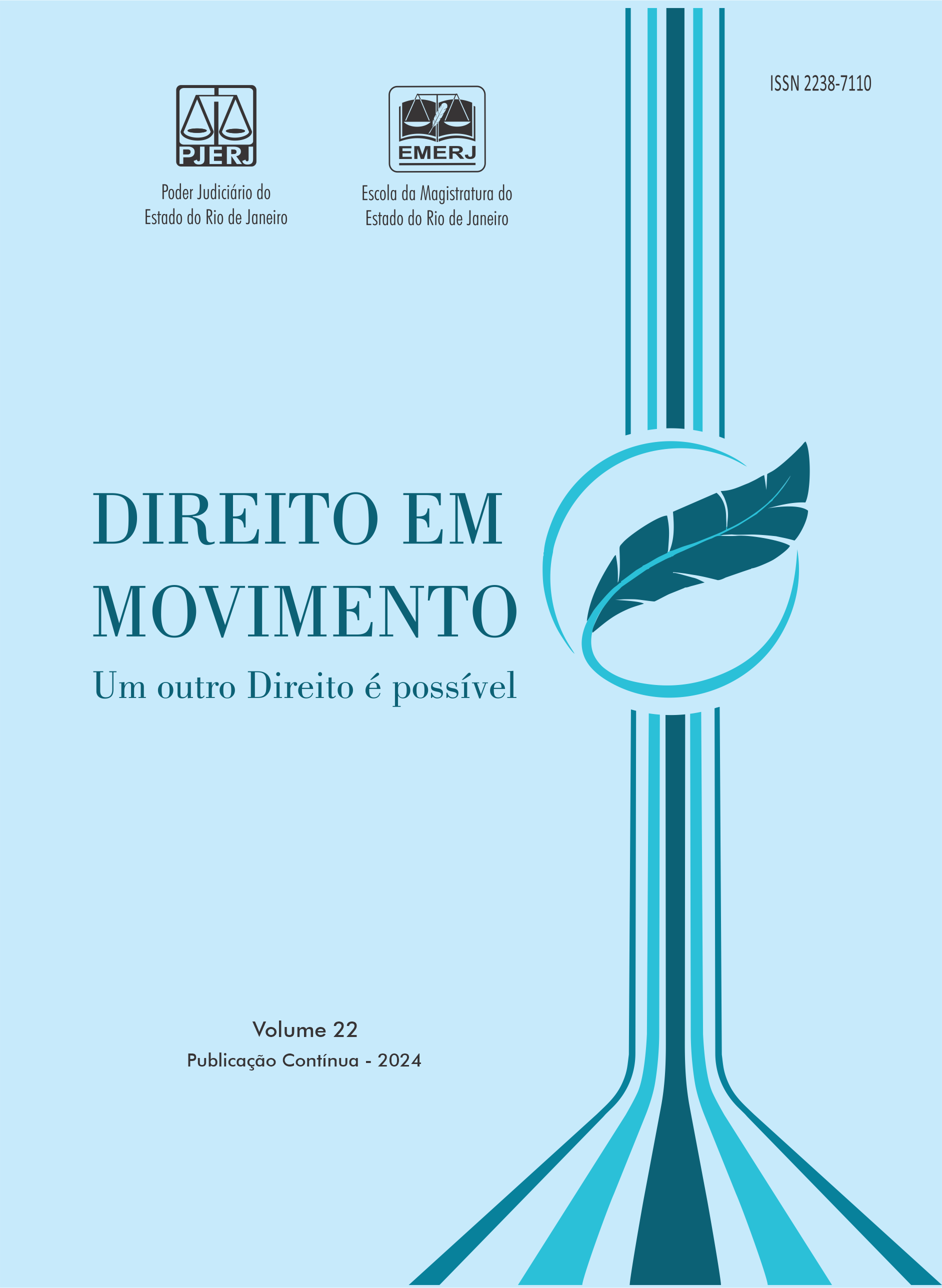Considerations on Federal Court of Justice Theme 1033
Challenges in compliance of judicial decisions in health
Keywords:
healthcare judicialization, collision of constitutional principles, general repercussion, distinguishingAbstract
The present work aims to discuss Theme 1033 of the Federal Supreme Court, judged as a general repercussion, in Extraordinary Appeal 666.094 – Federal District, in which it established criteria for reimbursement of services provided by a private unit in favor of patients in the Unified Health System due to compliance of court order. The challenge consisted of establishing a reasonable and proportional way to reimburse the services provided by the private unit, overcoming the controversy regarding the amount being freely arbitrated by the private hospital versus the value contained in the Unified Health System table. The constitutional density of the issue is refined on the following question: the Federal Constitution allows two types of health services to be carried out by private agents, namely: complementary and supplementary. Therefore, the Federal Supreme Court adopted as a reimbursement criterion the multiplication of the Reimbursement Valuation Index, stipulated at 1.5, by the value of the Unified Health System table. The application of the ipsis litteris thesis, however, can cause serious harm to the service provided to the population in regions with a lack of service providers, and there must be distinguishing according to the specific case. The methodology that will be used in this present work is that of a practical case study in which the distinguishing adopted also in Theme 1033, judged of general repercussion analyzed by the Federal Supreme Court, is used, to be granted in an exceptional way through (judicial injunction) access to healthcare for a patient at imminent risk of loss of human life. The term distinguishing according to legal literature occurs when the Court gives a decision that does not apply to the Court's jurisprudence, due to the fact that the case brought to the court has idiosyncrasies that do not conform to the consolidated jurisprudence, and, therefore, it is exceptional for the decision to be adopted in that specific case.
References
CASONATO, F. A.; ALBUQUERQUE, A. A. de. Análise dos impactos do financiamento do SUS na gestão do Hospital Universitário da UFSCar. Anais do Congresso Brasileiro de Custos – ABC, São Leopoldo, 2022. Disponível em: https://anaiscbc.emnuvens.com.br/anais/article/view/4967. Acesso em: 02 dez. 2023.
BARROSO, L. R. A judicialização da vida e o papel do Supremo Tribunal Federal. Belo Horizonte: Fórum, 2018. 290 p.
BRASIL. Conselho Nacional de Justiça. Recomendação n. 146, de 28 de novembro de 2023. Dispõe sobre estratégias para o cumprimento adequado das decisões judiciais nas demandas de saúde pública. Brasília, DF: CNJ, 2023.
BRASIL. Conselho Nacional de Justiça. Recomendação n. 134, de 9 de setembro de 2022. Dispõe sobre o tratamento dos precedentes no Direito brasileiro. Brasília, DF: CNJ, 2022. Disponível em: https://atos.cnj.jus.br/files/original19462820220912631f8c94ea0ab.pdf. Acesso em: 03 dez. 2023.
BRASIL. [Constituição (1988)]. Constituição da República Federativa do Brasil de 1988. Brasília, DF: Presidente da República, [2016]. Disponível em: http://www.planalto.gov.br/ccivil_03/constituicao/constituicao.htm. Acesso em: 02 dez. 2023.
BRASIL. Decreto n. 7.508, de 28 de junho de 2011. Regulamenta a Lei nº 8.080, de 19 de setembro de 1990, para dispor sobre a organização do Sistema Único de Saúde - SUS, o planejamento da saúde, a assistência à saúde e a articulação interfederativa, e dá outras providências. Brasília, DF: Presidência da República, 2011. Disponível em: https://www.planalto.gov.br/ccivil_03/_ato2011-2014/2011/decreto/d7508.htm. Acesso em: 5 dez. 2023.
BRASIL. Lei n. 8.080, de 19 de setembro de 1990. Dispõe sobre as condições para a promoção, proteção e recuperação da saúde, a organização e o funcionamento dos serviços correspondentes e dá outras providências. Brasília, DF: Presidência da República, 2002. Disponível em: https://www.planalto.gov.br/ccivil_03/leis/l8080.htm. Acesso em: 03 dez. 2023.
BRASIL. Lei n. 9.656, de 3 de junho de 1998. Dispõe sobre os planos e seguros privados de assistência à saúde. Brasília, DF: Presidência da República, 2002. Disponível em: https://www.planalto.gov.br/ccivil_03/leis/l9656.htm. Acesso em: 3 dez. 2023.
BRASIL. Supremo Tribunal Federal. Recurso Extraordinário n. 666094/DF. Processo n. 0020743-81.2008.8.07.0001. Direito constitucional e sanitário. Recurso extraordinário. Repercussão geral. Impossibilidade de atendimento pelo SUS. Ressarcimento de unidade privada de saúde. Recorrente: distrito federal. Recorrido Unimed Brasília cooperativa de trabalho médico: Relator: Min. Luís Roberto Barroso, 04 de fevereiro de 2022. Disponível em: https://portal.stf.jus.br/processos/detalhe.asp?incidente=4178086. Acesso em: 3 dez. 2023.
CARVALHO, C. de D.; & CARVALHO, F. de D. Judicialização da saúde no Brasil: da história à contemporaneidade. Revista Brasileira de Desenvolvimento, v. 6, n. 12, p. 99759-99777, dez. 2020. Disponível em: https://doi.org/10.34117/bjdv6n12-460. Acesso em: 02 dez. 2023.
FERRAZ, Taís Schilling. A amplitude dos efeitos das decisões sobre questão constitucional de repercussão geral: critérios para aplicação de precedentes no direito brasileiro. 2015. 268 f. Dissertação (Mestrado em Direito) – Pontifícia Universidade Católica do Rio Grande do Sul, Faculdade de Direito, Programa de Pós-Graduação em Direito, Porto Alegre, 2015, p. 182.
GONÇALVES, M. A. Organização e funcionamento do SUS. Florianópolis: Departamento de Ciências da Administração/UFSC, 2014. 132p.
LUNARDI, Fabrício Castagna. Curso de direito processual civil. 3. ed. São Paulo: Saraiva Educação, 2019, p.673.
MARQUES, Aline et al. Judicialização da saúde e medicalização: uma análise das orientações do Conselho Nacional de Justiça. Instituto de Estudos Avançados da Universidade de São Paulo, São Paulo, v. 33, n. 95, jan./abr. 2019. Disponível em: https://doi.org/10.1590/s0103-4014.2019.3395.0014. Acesso em: 02 dez. 2023.
NETO, G.; SCHULZE, C. Direito à saúde Análise à luz da judicialização. Porto Alegre: Verbo Jurídico, 2013.
ROCHA, Danilo et al. Judicialização da saúde no Brasil: do contexto histórico às perspectivas futuras. Revista de Direitos Sociais, Seguridade e Direitos Sociais, v. 6, n. 1, jan./jun. 2020. Disponível em: http://dx.doi.org/10.26668/IndexLawJournals/2525-9865/2020.v6i1.6395. Acesso em: 02 dez. 2023.
SANTOS, I. S.; SANTOS, M. A. B.; BORGES, D. C. L. Mix público-privado no sistema de saúde brasileiro: realidade e futuro do SUS. In: A saúde no Brasil em 2030: prospecção estratégica do sistema de saúde brasileiro: estrutura do financiamento e do gasto setorial. Rio de Janeiro: Fiocruz/Ipea/Ministério da Saúde/Secretaria de Assuntos Estratégicos da Presidência da República, 2013. v.4. p. 73-131.
WANG, D. W. L. Constituição e política na democracia: aproximação entre direito e ciência política. São Paulo: Marcal Pons, 2014.
Ventura, M. et al. Judicialização da saúde, acesso à justiça e a efetividade do direito à saúde. Physis, Rio de Janeiro, v.20, n.1, p. 77-100, 2010. Disponível em: https://doi.org/10.1590/S0103-73312010000100006. Acesso em: 02 dez.2023.
VIEIRA, F. Direito à saúde no Brasil: seus contornos, judicialização e a necessidade da macrojustiça. Brasília: Livraria Ipea, 2020. Disponível em: https://repositorio.ipea.gov.br/bitstream/11058/9714/1/TD_2547.pdf. Acesso em: 02 dez. 2023.
VIEIRA, F. Judicialização e direito à saúde no Brasil: uma trajetória de encontros e desencontros. Revista de Saúde Pública, v. 57, n. 1, 2023. Disponível em: https://doi.org/10.11606/s1518-8787.2023057004579. Acesso em: 02 dez. 2023.
Downloads
Published
How to Cite
Issue
Section
License
Copyright (c) 2024 Eduardo Carvalho, João Pedro Gebran Neto, Eduardo Perez Oliveira

This work is licensed under a Creative Commons Attribution 4.0 International License.
Authors who publish in this Journal agree to the following terms:
- Authors retain copyright and grant the Journal of Constitutional Research the right of first publication with the article simultaneously licensed under the Creative Commons - Attribution 4.0 International which allows sharing the work with recognition of the authors and its initial publication in this Journal.
- Authors are able to take on additional contracts separately, for non-exclusive distribution of the version of the paper published in this Journal (eg.: publishing in institutional repository or as a book), with a recognition of its initial publication in this Journal.
- Authors are allowed and encouraged to publish their work online (eg.: in institutional repositories or on their personal website) at any point before or during the submission process, as it can lead to productive exchanges, as well as increase the impact and the citation of the published work (see the Effect of Open Access).

















